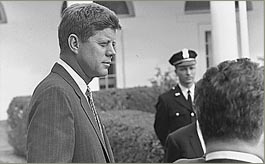 |
|
 |
|
 |
|
The Mississippi Crisis |
|
| When an intrepid black man, James Meredith, won a federal lawsuit to gain admission to the University of Mississippi in 1962, Governor Ross Barnett personally blocked his way. It was Kennedy's job to ensure Meredith be allowed entry. Though he ultimately won the battle to get Meredith into "Ole' Miss," JFK was forced to do the one thing he most wanted to avoid: send federal troops to the South. |
|
|
 |
|
Letters Between Meredith and "Ole' Miss" |
|
| Read the written correspondence between James Meredith and Robert Ellis, the Registrar of the University of Mississippi. The two men traded letters from the beginning of 1961, when Meredith first expressed interest in attending "Ole' Miss," to June of that same year, when Meredith filed suit against the University. |
|
|
|
John F. Kennedy was the first U.S. president to make the secret recording of phone calls and meetings a regular tool of his presidency. The three presidents who preceded him - Dwight D. Eisenhower, Harry S.Truman and Franklin D. Roosevelt - had experimented with audio recorders, but JFK was the first to keep the tape rolling.
In the summer of 1962, nearly two years into his presidency, Kennedy ordered the Secret Service to bug the Oval Office and the Cabinet Room, and to patch a recording device - called a Dictabelt - into his Oval Office phone. No record of Kennedy's rationale for taping has been discovered. Scholars say it's likely that JFK wanted an accurate transcript of important events that could aid in writing his memoirs. Kennedy's personal secretary, Evelyn Lincoln, said the president decided to make secret tapes for another reason: after the calamitous Bay of Pigs invasion, advisors who privately urged him to attack Cuba later disavowed the plan. Kennedy wanted to be able hold both aides and politicians to their word.
On October 22, 1962, Kennedy dialed up former President Dwight D. Eisenhower for advice on the Cuban Missile Crisis and taped the call. Kennedy was nearly two years into his presidency when he began secretly recording conversations. During the 13-day crisis, he taped nearly every meeting he held with a team of key advisors.
Kennedy taped some 260 hours of conversation, mainly in meetings. He recorded only 12 hours of phone calls. Still, those calls showcase legendary aspects of Kennedy's personality and executive style. He comes across as confident, smart and refreshingly witty. JFK chuckled easily. As historian William Doyle observes, "He sounds like a friend or a big brother."
Kennedy was known as an impatient executive, eager to get the information he needed and move on. According to Doyle, Secretary of State Dean Rusk said, "I learned to speak precisely to the point at hand, then shut up and go back to my office." Though Kennedy was usually very courteous on the phone, he would often signal his apprehension of details with a lot of quick "yeahs" and "uh-huhs." He'd hang up unceremoniously.
Kennedy was also good at sounding in control even when he wasn't. In September, 1962, Kennedy confronted a racial crisis in Mississippi that threatened to erupt into a bloody insurrection. The quick-firing Kennedy was forced to take his time with the slow-talking Mississippi Governor, Ross Barnett.
|

